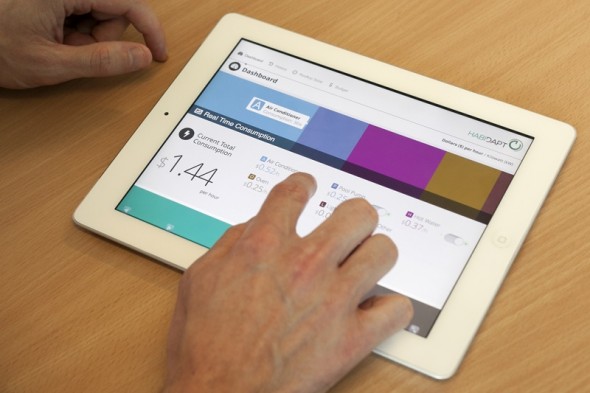Australian-made technology that will allow householders to remotely monitor and control their electricity usage – and utilities to coordinate demand management programs – is being trialled in Perth and regional Queensland.
The technology, known as Eddy – and which is described on the CSIRO website as a “home energy app” – uses cloud-based software and mini smart meters to monitor power usage, as well as switch on and off major appliances – think air conditioners, pool pumps, hot water systems – via users’ phones, tablets and/or computers.
Commercialised by Australian company HabiDapt, the technology was developed by CSIRO, based on the organisation’s Energy Management System, which has previously been adapted for use on King Island’s Smart Grid.
For households, the device keeps track – and control – of electricity use while also collecting and analysing data, which is then used to make recommendations to increase efficiencies, thereby saving them money through reduced consumption.
According to the HabiDapt website, Eddy can switch on and off controlled circuits or appliances to respond to personalised ‘set and forget’ settings – like switching on your pool pump or hot water heater when energy is cheaper, or when your solar system is generating surplus energy.

Of course, this is not an entirely new thing. For instance, remote, energy saving climate control technology has been around since 2011, when the much coveted Nest Learning Thermostat was released onto the US market.
As Time magazine describes it, “Gorgeous to look at, and making your home energy bill pretty too, this $249 game-changer has stood up well since it was first released.
According to Time, Nest’s popularity also comes down to the fact that it doesn’t require the user to undertake any programming whatsoever. “Just put it on the wall while you go about your business. Nest’s auto-scheduling feature takes over from there, turning up when you typically like it warmer, down when you tend to want it cooler, and off when you head off to work.” It can also detect when you’re home or away.
Similarly, Eddy is about making things simpler for efficiency-minded consumers.
According to HabiDapt, while it relies on a sophisticated software platform, it is fundamentally a simple technology, which “uses the ‘internet of things’ to manage your energy so that you can spend your time, and money, on the things that really matter.”
For energy retailers like Ergon Energy – which is collaborating on trials of the CSIRO technology that are yet to happen in regional Queensland – the technology will also allow consumers to take part in demand management programs, reducing stress on the grid during peak periods in return for energy bill discounts, or other rewards.
Demand management is considered by many to be crucial ingredient for high-functioning future electricity grids, despite the general reluctance of utilities to embrace it.
As we report today, the rule maker for Australian electricity markets – the AEMC – has finally released proposed changes that would encourage demand management schemes such as energy efficiency and battery storage, but which may come too late to head off another major spree of expensive grid upgrades in the meantime.
But while the incumbent energy market gets its act together, CSIRO research leader Glenn Platt hopes energy consumers will use “Eddy” to gain control over their electricity and save money.
“The tool really highlights how easy it is for people to make big savings on their energy bill without impacting on their lifestyle,” Platt said.
“By viewing when their home is exporting excess energy to the grid, households with solar PV systems can save additional money by programming their system to run certain appliances when the sun is shining.
“With the option of taking part in demand management schemes, the system can also reward households for using less electricity during peak energy periods.”
“We want to give households an energy management tool that is simple to use and unlocks lasting benefits,” HabiDapt CEO Stephen Kubicki said.
“Eddy gives households control over their energy and saves them money.
“As well as giving households tools to understand and manage their energy, Eddy lets people participate in the energy market by reducing peak demand in ways that, until now, have only been available to large-scale commercial consumers.”
HabiDapt is currently trialling the technology in homes with solar PV systems in Perth, and is also rolling the system out with Ergon Energy in Townsville, where it is being offered to customers as ‘HomeSmart’.
Truong Duy
